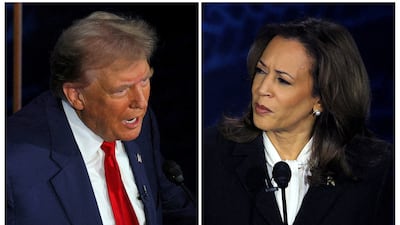With November 5 fast approaching, the US presidential election is shaping up to be a game-changer for financial markets.
This pivotal event could unleash shifts in policy, economic direction and global relations – setting the stage for volatility across stocks, bonds, currencies and even cryptocurrencies.
Investors and traders know the stakes are high, as new policies and fiscal strategies have the potential to alter the landscape of every major asset class.
Let’s dive into the outlook for the markets post-election, offering insights into which sectors and assets may be most affected.
While prediction markets have recently indicated a widening lead for Republicans, many commentators see a razor-thin margin between candidates in this election that adds an extra layer of unpredictability for investors and traders. This tight race magnifies the potential for sudden swings, making it a uniquely unnerving scenario for traders watching every poll and policy signal.
Macroeconomic and fiscal outlook
The election outcome is set to redefine US fiscal policy, with sweeping implications for market confidence and economic growth. Both major parties lean towards expansionary fiscal measures, despite the International Monetary Fund’s concerns over growing fiscal deficits.
A Republican victory could steer towards tax cuts and infrastructure investments, potentially pushing the US budget deficit to $5.8 trillion by 2034. On the other hand, a Democratic administration may prioritise progressive taxes and social programmes while holding the current fiscal line.
With the debt-to-gross domestic product ratio projected to hit 108 per cent over the next five years, the incoming administration faces the critical challenge of fuelling growth while managing fiscal sustainability.
Here are the crucial assets likely to be most affected by US fiscal policy changes:
- US Treasuries: Fiscal expansion could drive up government borrowing, affecting bond yields and prices.
- Equities: Sectors like infrastructure, health care and technology could benefit from targeted spending or tax policy shifts.
- US dollar: Increased deficits may weaken the dollar due to concerns over national debt, affecting global currency flows.
- Commodities: Higher infrastructure spending can boost demand for metals like steel and copper.
- Cryptocurrencies: Fiscal policy uncertainty and potential inflation could increase interest in decentralised assets.
Stocks
The US stock market has a history of unique patterns around election cycles, with the S&P 500 often experiencing strong gains before election day and mixed performance afterwards – especially during transitions of power.
Leading up to the 2024 election, the index has increased over 20 per cent year to date including dividends, which many market experts attribute to the expectations of a Trump victory. However, post-election periods tend to bring waves of volatility as new policies take shape. Historical data reveals that market lows often follow within two years of a presidential shift, as seen in 2000 and 2008.
With anticipated rate cuts from the Federal Reserve and potential fiscal boosts, investors may face near-term market corrections, but a supportive fiscal policy could pave the way for a more sustained recovery if it lifts corporate earnings.
Bonds
The bond market is on high alert as election-related uncertainties loom, with inflation and fiscal policy top of mind.
Historically, US government bond yields have swung sharply post-election; after 2016, for example, the 2-year bond yield nearly doubled amid expectations of aggressive fiscal spending.
In 2024, projected monetary easing paired with expansionary fiscal policies could stoke inflation fears, likely pushing bond yields higher. Alternatively, a conservative fiscal path aimed at controlling inflation could help stabilise yields.
Ultimately, the bond market’s course will hinge on the elected administration’s fiscal and trade policy strategies, setting the stage for potential volatility.
FX market
The US dollar’s path after the 2024 election will be shaped by shifts in monetary policy and global risk sentiment. Traditionally, a strong dollar reflects higher interest rates and market confidence in the US economy.
Yet, if the Federal Reserve moves quickly to cut rates as inflation cools, the dollar could encounter downward pressure.
Adding to the complexity, the Republican party’s proposed stance on trade and tariffs may amplify volatility, particularly in currency pairs like EUR/USD, USD/JPY and USD/CNY.
Cryptocurrencies
Cryptocurrencies like Bitcoin and Ethereum are primed to react to election outcomes.
With a potential move towards a more accommodative monetary policy, digital assets could see growth from increased liquidity and rising demand for alternative investments.
Regulatory approaches under the new administration will also be critical: a Republican-led government may lean towards deregulation, promoting crypto innovation and adoption, while a Democratic administration might prioritise consumer protections with stricter regulations, potentially sparking short-term volatility.
Navigating post-election market shifts
This election promises to reshape the investment landscape, making vigilance and flexibility essential for navigating what lies ahead. Make sure you stay alert and informed.
Justin Biebel is director of product implementation and clearing at neo-broker amana

